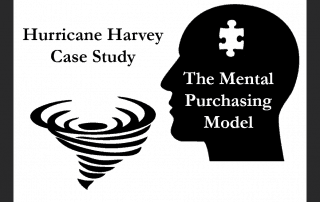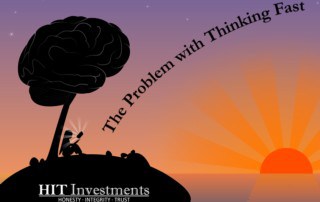Behavioral Finance and Economics
Hurricane Harvey Mental Model Case Study With Regards to Purchases
When I first wrote about the mental model for purchases I did not imagine that my own personal case study would follow. But then again, who would have thought Hurricane Harvey was going to bring more than 60 inches of rainfall. That volume of rain shattered the previous record by more than 12 inches! It has now been almost 600 days since thirteen of those inches found their way into our home and our entire first floor was destroyed. Since being rescued on August 30th, 2017, we have demolished, dried, rebuilt, and since moved back into our home. The experience [...]
How The Illusion of Control Bias Impacts Investing
The illusion of control bias is the tendency for people to think that they have more control than apparent over events. It’s like wearing a rabbit’s foot to an exam or believing you’re safer driving than being a passenger. Neither can influence the outcome of events – good or bad – but the belief can cause real-world harm. In reality, chance plays a bigger role than we give it credit for, and in the case of investing, this can hurt your finances. Whether you’re investing in the wrong things or investing too much, the illusion of control could hinder your [...]
Sitting on an Island within Hurricane Harvey
As the kids go down for a nap and the waters begin to stabilize I gather some of our thoughts over the last couple days, and the days to come. I learned of what was soon to become Hurricane Harvey from a co-worker last Tuesday, 7 days ago. This consisted of nothing more than an awareness of a storm that was over the Yucatan. I came home from work that day and told my wife over dinner. Neither of us thought much of it as it didn’t come up again until we did 30 seconds of research on our phones [...]
The Death of Procrastination
We all put off unpleasant tasks. In surveys 95% of all people admit to procrastinating, with about a quarter of them saying it is a chronic, defining characteristic. Our innate human behavior is to put off less appeasing tasks regardless of importance. I struggle at times to get out of bed, to tackle mundane tasks, or to get my workout in. I even had an urge to delay writing the article you’re reading today. It’s unfortunate the consequences or benefits of procrastination are many times unknown. Fortunately, in the investing world, the numbers paint a clear picture. For instance, if [...]
The Problem with Thinking Fast
A burger and a slice of cheese together cost $1.10. The burger costs a dollar more than the cheese. How much does the cheese cost? (It’s more impactful if you answer how much the cheese costs before continuing on) Your answer to the cost of cheese may have depended on which psychological mode of thinking you engaged in. If you chose to answer quickly, your answer was likely 10¢, but if you stopped and worked the answer meticulously then you should have come up with the correct answer of 5¢. For those interested, here’s the algebra: $1.10 = Cheeseburger Cost [...]
Home Bias, Is It Time to Take a Global Look
We have many behavioral biases and the latest data shows that “home bias” is one of them. Home bias is where we invest more of our assets in the country and community we live rather than globally. Becoming aware of our biases, including our home bias, enables us to make more rational personal finance and investing decisions. The IMF (International Monetary Fund) and MSCI All World Index gathered data from the five largest countries by market size. All five demonstrated a significant home country bias, rather than a global market cap weighted allocation. Data as of December 31, [...]







